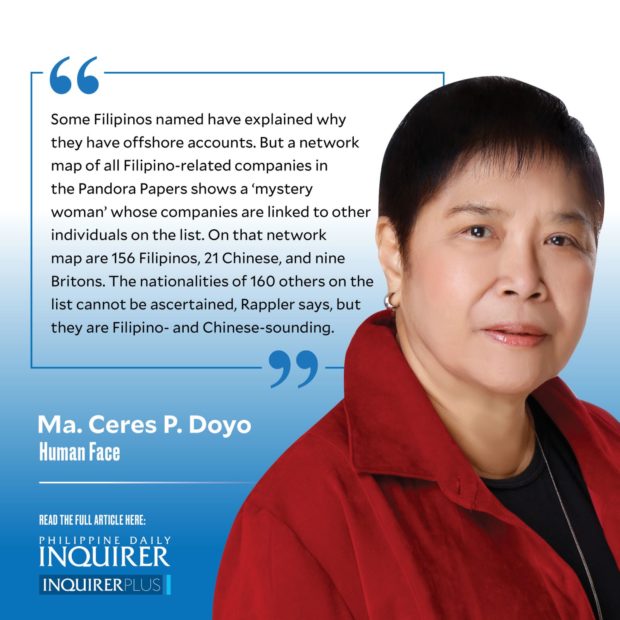Filipino names in The Pandora Papers

Backbreaking digging went into the publication of “The Pandora Papers” that revealed “the inner workings of a shadow economy that benefits the wealthy and well-connected at the expense of everyone else.”
That is the blurb that went below the title of the investigative report “Offshore havens and hidden riches of world leaders and billionaires exposed in unprecedented leak.” (https://www.icij.org/investigations/pandora-papers/)
Article continues after this advertisementBylined The International Consortium of Investigative Journalists (ICIJ), “The Pandora Papers” is a global collaboration between the nonprofit ICIJ and, locally, the Philippine Center for Investigative Journalism (PCIJ). They are heroic muckrakers of our time.
The PCIJ team: Carmela Fonbuena, Miriam Grace A. Go, Karol Ilagan, Elyssa Lopez, Pauline Macaraeg, Ralf Rivas, and Felipe Salvosa.
I mention the bylines before going into the report itself to stress that real journalists and journalism are alive and well in this age of fake news reports, unfounded conspiracy theories, and misinformation. These journos work to correctly inform society while liars in high places are holding court and dumbing down the hoi polloi and the intellectually lazy.
Article continues after this advertisementPandora in the title because, as in the childhood tale we had read, the box revealed awesome and heretofore unknown contents that stunned the bejesus out of those who opened it.
The damning opening salvo: “Millions of leaked documents and the biggest journalism partnership in history have uncovered financial secrets of 35 current and former world leaders, more than 330 politicians and public officials in 91 countries and territories, and a global lineup of fugitives, con artists and murderers.”
The documents, once held in secret, exposed the offshore dealings and financial activities of heads of state and 130 billionaires from several countries. These so-called power players are “stashing assets in companies and trusts while their governments do little to slow a global stream of illicit money that enriches criminals and impoverishes nations.”
The leaked documents, known as the Pandora Papers, provide a list of “hidden treasures.” The ICIJ’s acquired trove consists of more than 11.9 million confidential files. ICIJ led a team of more than 600 journalists from 150 news outlets that spent two years sifting through them, tracking down sources, and digging into court records and public documents in many countries.
Yes, Pandoritas and Pandoritos, there are Philippine-based owners of offshore accounts who could be described as “mysterious” because, as Rappler says, “some individuals, who are either previously unheard of in elite circles or never found in legitimate databases, turned out to be the beneficiaries of multiple accounts.” Whoa! And the purpose of many accounts could not be ascertained, Rappler adds.
ICIJ accessed the documents of 14 offshore service providers and found five Philippine-based clients. Rappler and PCIJ found “very little information” about Filipinos with the most links to offshore accounts. While they also do not necessarily imply that illegal transactions were done through these companies and individuals, “We raise questions on the purposes of keeping these offshore.”
Some Filipinos named have explained why they have offshore accounts. But a network map of all Filipino-related companies in the Pandora Papers shows a “mystery woman” whose companies are linked to other individuals on the list. On that network map are 156 Filipinos, 21 Chinese, and 9 Britons. The nationalities of 160 others on the list cannot be ascertained, Rappler says, but they are Filipino- and Chinese-sounding.
So, where do all these lead to? What do these mean besides the fact that Filipino nationals and entities, the “mysterious” among them, along with powerful global leaders and personalities have offshore accounts?
Explains ICIJ: “In an era of widening authoritarianism and inequality, the Pandora Papers investigation provides an unequaled perspective on how money and power operate in the 21st century—and how the rule of law has been bent and broken around the world by a system of financial secrecy enabled by the U.S. and other wealthy nations.
“The findings by ICIJ and its media partners spotlight how deeply secretive finance has infiltrated global politics—and offer insights into why governments and global organizations have made little headway in ending offshore financial abuses.” Remember “deeply secretive finance.”
For starters, put all that in the context of the ongoing Senate investigation of the multibillion government deal with undercapitalized traders of health supplies and the “mysterious” personalities involved.
















